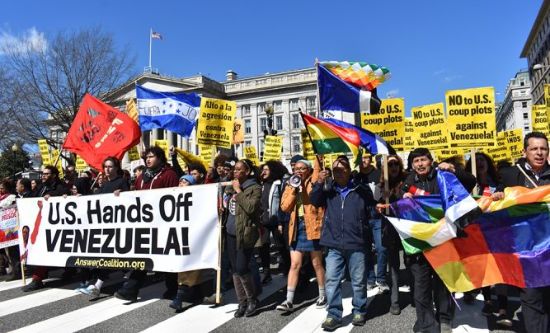
On 12 February 2021, UN rapporteur Alena Douhan released a report from her 12-day visit to Venezuela to investigate the effect of the comprehensive US and EU sanctions placed on the anti-imperialist state. In the report she condemns the sanctions and urges countries to lift their blockade, citing the widespread damage to Venezuelan civilians and its infrastructure. CANDICE STARLING reports.
The UN rapporteur interviewed a broad swathe of Venezuelans, including members of the ruling United Socialist Party of Venezuela (PSUV) and ordinary citizens, as well as opposition forces – yet US critics have still claimed that she did not meet a wide enough range of people. The finalised report is set to be announced at the UN in September. Douhan noted that sanctions directly prevent Venezuela from fulfilling the requirements of Article 4 of the International Covenant on Civil and Political Rights, which states that in time of public emergency the state must be allowed to take measures to deal with the immediate situation. This, she concludes, makes the sanctions illegal under international law. In addition, she states attempts to change the government breach the principle of sovereign equality of states. In implementing the sanctions numerous other laws have been broken, including obligations to allow for the full enforcement of human rights. A previous UN rapporteur in 2017 compared even the then-looser sanctions to a modern-day medieval siege.
The United States imposed sanctions on Venezuela in 2005 after Hugo Chavez set up the PetroCaribe oil alliance to provide 14 impoverished Caribbean and central American countries with cheap energy. Venezuela has one of the largest oil reserves in the world, of which at the time large US oil companies owned a majority share. In 2015 Obama declared a state of emergency in Venezuela, citing responses to anti-government protests. This led to the beginning of harsher sanctions on individuals and confiscating public infrastructure. Under the Trump administration sanctions were heavily tightened including on oil, Venezuela’s largest export.
Whilst there are exceptions for certain essential goods such as food and medicine, processes to obtain these are lengthy, costly and usually ineffective. The report strongly recommends lifting the sanctions altogether. It states that the Venezuelan government’s revenue has shrunk by 99%, forcing the country to only operate on 1/100th of its pre-sanction income. With around $30bn of assets confiscated worldwide Venezuela finds itself in a devastating situation.
Food imports into Venezuela historically count for half the national diet; sanctions mean that malnourishment has grown significantly. Whilst the government food aid programme ‘Local Committees for Supply and Production’ covers six million households, maintaining necessary food intake is difficult on such low government income.
The sanctions also harshly restrict imports of medicine, water, gasoline, spare-parts, electricity and other essential goods. 30-50% of public service staff placements are currently vacant, including in the medical sector, leading to even more strain on the health service in the middle of the pandemic. Water has to be rotated through houses meaning most people only get water for a few hours a week – not only due to lack of staff but also because the chemicals used to purify water are also sanctioned.
Though an agreement was drawn up to allow the release of some of the Venezuelan gold stolen by the Bank of England so that it can be used to procure Covid-19 vaccines via a third party, Juan Guaido, the reactionary self-proclaimed President recognised only by imperialist states, has refused to sign. Guaido set himself up as president on the flimsiest of pretexts in 2019 and, while he commands barely any support within Venezuela, he was immediately acclaimed by Britain, the US and more than 50 of their allies. After Guaido’s many failed and ludicrous coup attempts, some countries, including those in the European Union, have rowed back and been forced, grudgingly, to reocognise the democratically elected President Nicolas Maduro. But, with the continued backing of Britain and the United States, Guaido is still able to inflict damage on the Venezuelan working class, and his refusal to sign the vaccine agreement means it cannot go ahead, leaving millions of Venezuelans vulnerable.
The Biden administration has stated that it is in ‘no rush’ to lift the sanctions and reiterated support for Guaido. No change there, then. The new Democratic President has also renewed the executive order to continue the national state of emergency over Venezuela, describing the country as posing an ‘unusual and extraordinary threat to the [US] national security and foreign policy’. This comes only nine months after the capture of 13 mercenaries on the shores of Venezuela who have since produced evidence implicating the White House in their attempted overthrow of Maduro.
The UN report makes clear that the sanctions placed on Venezuela are in flagrant disregard of international law. They have not achieved their goal of overthrowing Maduro or the PSUV, who continue to remain popular in the country, but they have destroyed the lives of regular Venezuelans who have to deal with extreme food, water and electrical insecurity. Most affected include women, children and indigenous peoples. Tens of thousands of people have died as a consequence. It’s clear that the real threat to human life comes from the US, Britain and European countries applying these murderous sanctions. Imperialism out of Venezuela!




